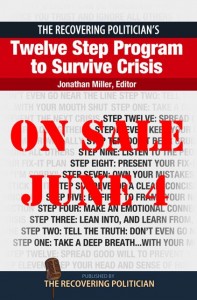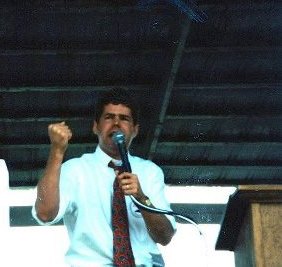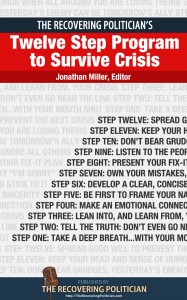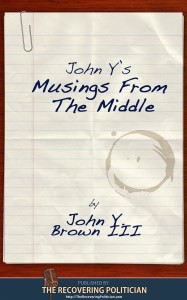By Artur Davis, on Thu Aug 8, 2013 at 10:00 AM ET Nate Cohn’s piece in the New Republic, which relies on results from a Pew survey out this week, offers some blunt conclusions on the challenges of Republican rebranding: relatively few rank and file Republicans actually want the party to shift toward more moderate ideological positions, and those who do are generally matched by GOP voters who would just as soon shift to the right, and substantially outpaced by the numbers who prefer the status quo.
To be sure, there are methodological challenges that Cohn acknowledges but deserve more analysis: for example, a survey that assumes that voters are correctly identifying, or that they even mean the same thing, when they describe their party’s “current position”, is begging for a set of false positives. But anyone who spends time at Republican activist events can attest that the gist of the data feels about right. To the extent there is enthusiasm for redefining the party, it is more oriented around hopes for “better messaging” or a “more positive way of framing our arguments” than a wholesale desire to revisit actual substantive policies.
That’s a challenge, for a variety of reasons that I will keep addressing in these pages, but I’ll pull out one aspect of it for an extra word of elaboration: the goal of broadening the party without changing it very much explains a lot about one particular African American outreach effort that is becoming faddish on the right: capitalizing on prospective tensions inside the Democratic base between blacks v. Latinos by emphasizing the potential costs that legalizing undocumented immigrants might have on black low wage workers.
I happen to be a skeptic of the Senate immigration legislation, who would prefer Republicans counter it with an amalgamation of approaches that cross conventional lines: support of something like the DREAM Act that prioritizes immigrants who migrated as children or teenagers, combined with a more rigorous employment verification regime and tougher border enforcement, and strengthening the penalties for illegal immigration to match, say, Canada’s felony status for undocumented workers and genuinely stiff sanctions for smuggling.
 But that skepticism does not translate into an intuition that black unemployment or limited access to jobs dominated by illegal immigrants is a major economic consequence of reform. The evidence of any trends to that effect seems highly selective. Most of the case rests on an overreliance on data showing that illegal immigration diminishes low level wages even further, without accounting for the obvious: the alternative to reform is not some national dragnet that would deport most of the illegal immigrant population, and open up previously immigrant dominated jobs, but a muddling through with the status quo in which the undocumented population ratches up each year and may hit 14.5 million by 2018. Nor do the arguments that blacks are adversely affected by a pathway to citizenship grapple with another just as apparent fact: the long waiting period for actual citizenship will still mean that the current undocumented pool remains for most of the next decade what it is today: a collection of workers who have become accustomed to abysmal wages and can’t sue or comfortably complain to federal safety regulators. In other words, a more attractive labor source to certain elements of the low skill retail, construction and agri-business sectors than blacks with legal status could conceivably be. But that skepticism does not translate into an intuition that black unemployment or limited access to jobs dominated by illegal immigrants is a major economic consequence of reform. The evidence of any trends to that effect seems highly selective. Most of the case rests on an overreliance on data showing that illegal immigration diminishes low level wages even further, without accounting for the obvious: the alternative to reform is not some national dragnet that would deport most of the illegal immigrant population, and open up previously immigrant dominated jobs, but a muddling through with the status quo in which the undocumented population ratches up each year and may hit 14.5 million by 2018. Nor do the arguments that blacks are adversely affected by a pathway to citizenship grapple with another just as apparent fact: the long waiting period for actual citizenship will still mean that the current undocumented pool remains for most of the next decade what it is today: a collection of workers who have become accustomed to abysmal wages and can’t sue or comfortably complain to federal safety regulators. In other words, a more attractive labor source to certain elements of the low skill retail, construction and agri-business sectors than blacks with legal status could conceivably be.
And the heavy flaws in the effort to lure blacks with immigrant bashing don’t compare with another underlying political reality: if a politician’s sympathy for low income blacks surfaces only in the context of thwarting immigration legislation, but has no antecedents in other contemporary policy fights, like extending unemployment benefits, or preserving the recently expired FICA tax cuts, that candidate is unlikely to plausibly position himself as a champion of low wage black aspirations.
Read the rest of…
Artur Davis: Another Poor GOP Strategy For Pursuing Black Votes
By John Y. Brown III, on Tue Aug 6, 2013 at 12:00 PM ET  How to know if you have reached middle age? How to know if you have reached middle age?
When someone asks you “If you could live your life over again what things would you do differently?” and you give them an exasperasted look that has an undercurrent of disgust and reply,
“What are you talking about? Are you even serious? People don’t get to live their lives over. At this point I’m not even sure I have the energy to finish the life I am living now much less think about a do over.”
If your response sounds like this you are probably middle-aged.
By Rod Jetton, on Mon Aug 5, 2013 at 3:00 PM ET Rod Jetton appeared on KSMU Radio to discuss The Recovering Politican’s Twelve Step Program to Survive Crisis.
Click here to listen to the interview.
Here’s the summary:
 Click here to purchase Two former Missouri politicians who were once mired in scandal have now written a book together. As KSMU’s Jennifer Davidson reports, the book is garnering some national attention.
Rod Jetton, former speaker of the Missouri House, and Jeff Smith, a former state senator, co-authored “The Recovering Politician’s Twelve Step Program to Survive Crisis.” Several other former politicians contributed chapters as well.
Jetton pleaded guilty two years ago to a misdemeanor assault, admitting he struck a woman in the face and choked her during rough sex. Smith spent a year in prison after pleading guilty to lying about a campaign violation.
Jetton says he was approached by the book’s editor, Jonathan Miller, about taking part.
“And he said, ‘You know, I think you really ought to tell your story. And we could put a nice little book together that could really help some folks who may be going, or going to go through some kind of crisis or scandal. [They could] have some concrete plans and techniques on how to handle it, and also learn that, no matter how their situation turns out, they can overcome it and still lead a happy, successful life,’” Jetton said.
Jetton’s chapter is about how to apologize for the mistakes you made. He says his troubles started when he spent all of his time working, and put his family on the back burner, which led him to make poor choices. Today, Jetton lives in Poplar Bluff and works for a surveying and engineering company that specializes in rural communities. He says his faith and family are his top priorities now.
By John Y. Brown III, on Thu Aug 1, 2013 at 3:00 PM ET  Kentucky has a constitutional oath that requires officeholders to swear they won’t fight in a duel. Yet at the same time Kentucky has the political crucible of Fancy Farm that requires candidates seeking statewide… and congressional office are required to endure each August —which at times has seemed less inviting than a duel with guns (and a few times less dangerous, too.). Kentucky has a constitutional oath that requires officeholders to swear they won’t fight in a duel. Yet at the same time Kentucky has the political crucible of Fancy Farm that requires candidates seeking statewide… and congressional office are required to endure each August —which at times has seemed less inviting than a duel with guns (and a few times less dangerous, too.).
It’s not bullets you fear but jeers and cheers (for your opponent) and the momentary mental lapse of twist of tongue that could be the gaffe that everyone talks about the next day. You fear humiliation on the most prized of our state’s political stages, the platform for political speeches at Fancy Farm.
Fancy farm is an amalgam of history and entertainment. Part historic and revered much like the old Chautauqua assembly and yet also part “trial by ordeal” much like the carnival game of baseball toss to cause the seated person to fall into the dunking tank. As a speaker at Fancy Farm you strive to be remembered as falling into the former category rather than into the metaphorical dunking tank. And if you succeed, you are the exception to the rule.
At 32 I was the Democratic Party’s nominee for secretary of state and slated to speak at the vaunted Fancy Farm picnic. The picnic is on a Saturday and I was staying in Paducah, Kentucky the entire week before leading up to Fancy Farm to campaign in the Western Kentucky region and prepare mentally for the big day. As the big day approached, the more nervous I got. Thursday I was barely able to eat. To make matters worse, it was my anniversary and, yes, I somehow blanked out and forgot. And didn’t remember before my wife reminded me. She had not forgotten. Fortunately, with the help of some wonderful local friends we found a romantic restaurant in Paducah to spend our 4th anniversary together. And after that romantic dinner, and the gift of a kitchen table my wife had been lobbying me to buy us for several months, and the passing of another 18 years of marriage, I almost feel like that incident is behind me now. Almost.
The next day was the other big annual event that weekend: The Democratic Party’s Bean Supper in Marshall County. It was my first visit to Marshall County since the primary and I got off to a rocky start after I announced to the large audience that it was “Great to be back in McCracken County again.” After the speech the chair of the Democratic Party, Terry McBrayer, whispered to me that I was actually in Marshall County. I asked Terry if I should get back on stage and correct myself and maybe explain it was confusing with both counties starting with the letter “M” but he suggested I just let it lie and work on getting it right next year. That was wise advice.
I also learned after my less than dazzling speech that swung for the fences and at best turned out to be a broken bat single (or arguably a forced walk) that sometimes less is more from the speaking stump. I spoke after attorney general candidate and current state auditor Ben Chandler. Ben gave a familiar and non-controversial speech that was well received, as always. I was all over the place with my speech trying to stand out. Trying to quote Shakespeare and comparing Larry Forgy to Hamlet. Afterward as we listened to others give their speech I asked Ben how I did. He smiled in the way a mentoring friend would if he were wanting to say to you, “Well, you didn’t humiliate yourself. But you came darn close a few times.” Of course, Ben was too much of a gentleman to say that and instead whispered to me, “You know, it’s not always the best strategy to try to give the most memorable speech at Fancy Farm.”
Read the rest of…
John Y. Brown, III: Fancy Farm Memories
By Rod Jetton, on Thu Aug 1, 2013 at 1:30 PM ET From KSGF 104.1, Springfield, Missouri:
 Click here to order
Guest: Rod Jetton- The Recovering Politician’s Twelve Step Program to Survive Crisis
Who is Rod Jetton and what was his involvement in Missouri politics? What is the theme that comes through this book that is written by 12 different authors? Where did he make his biggest mistake while in office and what is his chapter about? What is human nature when you are caught? What is his advice for those entering politics? What is the average person’s misconception about politicians?
Click here for the podcast.
By RP Nation, on Wed Jul 31, 2013 at 10:00 AM ET Did you know that we have a second Texas? If you didn’t, it’s not your fault. We don’t talk about it all that much. Unlike the Texas everyone’s familiar with, this one isn’t located in any one geographic location. Rather, it’s scattered throughout the United States. You probably know someone from the second Texas. Here’s the thing: Because we hardly ever talk about it, hardly anyone knows that only 17% of it is employed, compared to 59% (according to the American Communities Survey 2011) in the Texas most people think of.
However, most people in this Texas want to work. Of the other 83%, fully 80% want to work at least part-time and contribute to our society. This population is our nation’s disabled, and it is truly our country’s most underused economic resource.
Our disabled population makes up a large share of the total population – about one-fifth, according to some estimates. Saying that our disabled population is roughly the first Texas’ size is a very conservative estimate. The Census says that it’s actually both a second Texas and a second New York combined, all with that dismal 17% employment rate.
If counted on its own, Texas would have the 15th largest economy in the world based on 2011 data. New York would have the 16th largest. Together, the two states would be ninth, right under Italy and above Russia. Imagine what our second New York and Texas could be if they were employed at the same rate as everyone else. So why aren’t they working and contributing?
Read the rest of…
Lauren Gilbert: The 17% Employment Rate No One is Talking About
By John Y. Brown III, on Mon Jul 29, 2013 at 3:00 PM ET Incredible!
Just got to view a graph of my book sales during its first week.
All I can say is that if this were a roller coaster instead of a book sales chart, it would be epic! Everyone would want to try it!
In one week the book rocke…ted (downward) from the top 11,000 books selling on Amazon.com to the top 396,865. That is about a 4000% drop. Which is something few authors can claim. And have hard data to back it up. I claim it and have the data and am sharing it now.
There are a total of 8 million books on Amazon.com. So, in theory, being ranked 496,865th isn’t as bad as it sounds.
Except that it is.
 Click here to purchase It sounds so …..um, what’s the word?….Sounds so far behind everyone else. I guess that’s what I’m saying. I mean…have you ever had to pass up 385,000 of anything to get back to where you started? At what point do you look at that blur of 385,000 somethings and say to yourself, “You know what? I’ll try to pass some. Maybe 20 or 25. But the other 384,975 or 384,980 can have it.” I think I’m about to reach that point.
Another option that I am going to suggest to Amazon.com is to re-frame how they describe rankings in my sales territory. Tomorrow I’ll probably hit, say, rank 511,150th. I’m not going to tell anyone about that when it happens. 396,865th is bad enough. But I might be tempted to brag about it if Amazon.com described the ranking instead as “You are now ranked in the bottom 7.5 million in book sales listed on Amazon.com” Something about being in the bottom 7.5 million makes a bigger statement, makes me feel part of something bigger, and doesn’t sound so darn lonely as 396,865.
By John Y. Brown III, on Thu Jul 25, 2013 at 12:00 PM ET  Seeing the first sign or symptom of moving into a new phase in life can take our breath away, fill us with fear and anxiety, and send us into the dark abyss of internet searches to diagnose ourselves. Seeing the first sign or symptom of moving into a new phase in life can take our breath away, fill us with fear and anxiety, and send us into the dark abyss of internet searches to diagnose ourselves.
Sometimes the first sign is barely noticeable but other times it can be painfully and even shockingly apparent to everyone around the person going through a life transition. Except, of course, the person himself.
 Tonight I ran out to Walmart to pick up some household items and while waiting in the checkout line saw this magazine with a feature story about Matthew Perry tossed into my pile of purchases. Tonight I ran out to Walmart to pick up some household items and while waiting in the checkout line saw this magazine with a feature story about Matthew Perry tossed into my pile of purchases.
Shocked, I looked around to see who was the culprit.
It was me.
This is scary and good mean a range of possible life transitions. Some of them socially fatal.
By Artur Davis, on Thu Jul 18, 2013 at 10:00 AM ET Thomas Edsall’s column on the South’s racially polarized politics is so many clichés—the notion that thinly disguised bigots are astride the region’s Republican Party, that they have meanly pushed black state legislators to the margins, that they are presiding over some modern reign of terror on the black and poor, and that the Supreme Court has just made it fundamentally worse by setting aside a major provision of the Voting Rights Act.
But he is not wrong about a premise that lurks throughout his argument: more than any place in America today, the South is a zone where ideology and party do correlate almost entirely with racial identity. Measured against the backdrop of a national electorate where Barack Obama actually exceeded four of the last five Democratic presidential performances with whites, the South’s “white equals Republican” reality is jarring. To a disconcerting degree, routine ideological debate over spending priorities, education, and voting requirements turn into a perpetual argument over whether the intent of every policy is to disadvantage minorities. It’s a stultifying kind of environment.
At the risk of repetition, I’ll mention one more time that liberal critics like Edsall miss the perverse contributions that racially gerrymandered districts have made to the marginalization of black political interests: by guaranteeing that black voters are cordoned off into their own singular political communities and have only a marginal presence elsewhere, courts have ensured that those interests will never really be elevated outside black voting precincts. And the meme that it is malicious Republicans who have driven those gerrymandering trends ignores altogether the extent to which African-American Democrats and federal courts have sanctioned, actually demanded, those district lines.
It’s also worth reiterating another observation I have made in these pages. The Democrats whose fortunes have declined so precipitously in the region since 2008 are still only recently out of power in the Deep South, at least at the legislative level, and have a mixed to poor record of alleviating a range of sins Edsall and most liberals complain about, from tax systems that over-burden the working class, to bargain basement Medicaid programs, to thin levels of social services, to weak environmental protections.
 To be sure, southern Republicans can go depressingly tone deaf in their choice of priorities, from North Carolina’s rollback of criminal procedure protections in a state where weak employment is surely something more voters are fixated on, to Alabama’s meat-ax approach to illegal immigration, to the lack of GOP support in most of these states for the kind comprehensive education reform that might boost the region’s abysmal rankings in data that measure the quality of life for children. And yes, the South certainly lacks its share of imaginative, Mitch Daniel type Republicans who see entrenched poverty as the kind of dilemma conservative ought to be engaged in addressing. To be sure, southern Republicans can go depressingly tone deaf in their choice of priorities, from North Carolina’s rollback of criminal procedure protections in a state where weak employment is surely something more voters are fixated on, to Alabama’s meat-ax approach to illegal immigration, to the lack of GOP support in most of these states for the kind comprehensive education reform that might boost the region’s abysmal rankings in data that measure the quality of life for children. And yes, the South certainly lacks its share of imaginative, Mitch Daniel type Republicans who see entrenched poverty as the kind of dilemma conservative ought to be engaged in addressing.
But to the extent that minority southerners are, in Edsall’s terms, “hindered from shaping the policies that determine social and economic mobility and the overall quality of life”, the reasons are more complex than the cause effect that Edsall suggests. The solutions have as much to do with ending a bipartisan accommodation to special interests that are averse to cutting edged innovations as they do with taking Republicans to task. Of course, had Democrats not squandered capital on expanding casinos, and soft-pedaling clear-cut evidence of corruption within their own ranks, they might well have found a high ground that stanched their bleeding with at least suburban, educated whites who might be receptive to a progressive platform. And if the all too recent Democratic rule over southern legislatures had really produced the “New South” that Edsall and others are claiming is under siege, he might have a moral point rather than a partisan political one.
By Mark Nickolas, on Wed Jul 17, 2013 at 8:30 AM ET It’s been more than two years since I wrote my first piece for the RP. It was April 2011 and I had just entered the graduate Media Studies & Film program at The New School in New York City and was eager, bright-eyed, and knew little about how to make a film, yet alone feature-length documentary films. No doubt, while you can certainly become a successful filmmaker without spending $100,000+ for the formal training you can receive in graduate school, for some of us that is a worthy investment.
In May, I graduated with a newly-minted master’s degree and my filmmaking training wheels have been taken off. Now it’s time to see whether my talent can match my enormous ambitions. I’ve already completed one short film that has been receiving an unexpected amount of national attention in the past week and am already in pre-production on my first feature-length documentary that I landed last year.
So, I’m going to use this website as a personal journal of sorts as I head down this path. I’ll offer a behind-the-scenes style peek at what it means to be an emerging filmmaker in New York City and the things we must juggle, mine fields we must avoid, and obstacles we must clear in this hyper-competitive field where an early disaster can quickly dash your filmmaking hopes for good.
 I’ll admit it. This journey is very exciting but so enormously terrifying. A perfect mix, actually. I feel like I’m standing at Base Camp and looking up at Mt. Everest. But my 15+ years in politics prepared me in many ways to handle this moment. I’m certainly nowhere as intimidated by the grandeur of the stage or the media spotlight as my fellow (and much younger) classmates. I also seem to be able to get most people to answer the phone or return an email, if only because of my background and professional success in other somewhat related fields. I’ll admit it. This journey is very exciting but so enormously terrifying. A perfect mix, actually. I feel like I’m standing at Base Camp and looking up at Mt. Everest. But my 15+ years in politics prepared me in many ways to handle this moment. I’m certainly nowhere as intimidated by the grandeur of the stage or the media spotlight as my fellow (and much younger) classmates. I also seem to be able to get most people to answer the phone or return an email, if only because of my background and professional success in other somewhat related fields.
Those are important benefits, no doubt about it. But getting people to open the door is just the first of many steps. Whether I have actual talent to direct a film, am able to find enough donors to help fund the $400,000 budget — and can catch a few breaks — are the real questions.
The great news is that it seems I’ve caught a few breaks already. As has been highlighted at the RP last week, my quirky short film — My Life in the Canyon of Heroes — has shined a good amount of unexpectedly national attention on me over the past few days. After the film made the finals of Smithsonian magazine’s short film contest, it was highlighted in a story in the Atlantic. That led to emails from NPR’s Marketplace and CNBC’s Power Lunch who wanted to interview me for segments. Marketplace was taped and ran on Friday. I just confirmed with CNBC earlier today that we are taping my segment next to ‘Charging Bull’ on Thursday morning and it will run on Friday (1-2 pm ET). There may be more interviews in the coming weeks.
My Life in the Canyon of Heroes from Mark Nickolas on Vimeo.
Funny how life works. That little film was never meant to see the outside of a classroom. It began as a final project in my ‘Cinematic Place’ class last spring. I only submitted it to the Smithsonian at the suggestion of Deanna Kamiel, my professor, and had completely forgotten about it until just before it made the finals when they contacted me for some clearance and rights information. And once it made the finals, the media storm happened on its own. I didn’t reach out to anyone and was as surprised as everyone else when the national media was interested in a 6-minute film about a talking 7,000-pound bronze bull.
Yesterday, I learned that I didn’t win any of the final Smithsonian awards. But how could I be upset? Thousands of people have seen and voted and commented on my first completed short film and I have national press clips heading into fundraising for my first feature project that are priceless. The journey ahead remains terrifying, but I just got a taste of the possible. Maybe I’m now at Camp 1 instead of Base Camp. But — come on — that’s the easy part of climbing Mt. Everest. I get that.
So, I head into my first film with a nice surge of confidence to keep the fear in check. It feels good. There are going to be so many ups and downs in the coming year. Student loans payments are already on the horizon and few get rich making documentary films. But I’m a dreamer and not afraid to go for it. Maybe I’ll be one of the few that make a name for themselves in this field. Maybe I won’t. But I’ll know that I gave it my best shot.
Next week, I’ll preview my feature-length film, tentatively titled A Cloud of Suspicion. I look forward to sharing my journey with you, even when it sucks and I’m battered and bruised from the constant rejection. That’s, apparently, what I signed up for.
|
The Recovering Politician Bookstore
|
 But that skepticism does not translate into an intuition that black unemployment or limited access to jobs dominated by illegal immigrants is a major economic consequence of reform. The evidence of any trends to that effect seems highly selective. Most of the case rests on an overreliance on data showing that illegal immigration diminishes low level wages even further, without accounting for the obvious: the alternative to reform is not some national dragnet that would deport most of the illegal immigrant population, and open up previously immigrant dominated jobs, but a muddling through with the status quo in which the undocumented population ratches up each year and may hit 14.5 million by 2018. Nor do the arguments that blacks are adversely affected by a pathway to citizenship grapple with another just as apparent fact: the long waiting period for actual citizenship will still mean that the current undocumented pool remains for most of the next decade what it is today: a collection of workers who have become accustomed to abysmal wages and can’t sue or comfortably complain to federal safety regulators. In other words, a more attractive labor source to certain elements of the low skill retail, construction and agri-business sectors than blacks with legal status could conceivably be.
But that skepticism does not translate into an intuition that black unemployment or limited access to jobs dominated by illegal immigrants is a major economic consequence of reform. The evidence of any trends to that effect seems highly selective. Most of the case rests on an overreliance on data showing that illegal immigration diminishes low level wages even further, without accounting for the obvious: the alternative to reform is not some national dragnet that would deport most of the illegal immigrant population, and open up previously immigrant dominated jobs, but a muddling through with the status quo in which the undocumented population ratches up each year and may hit 14.5 million by 2018. Nor do the arguments that blacks are adversely affected by a pathway to citizenship grapple with another just as apparent fact: the long waiting period for actual citizenship will still mean that the current undocumented pool remains for most of the next decade what it is today: a collection of workers who have become accustomed to abysmal wages and can’t sue or comfortably complain to federal safety regulators. In other words, a more attractive labor source to certain elements of the low skill retail, construction and agri-business sectors than blacks with legal status could conceivably be.














